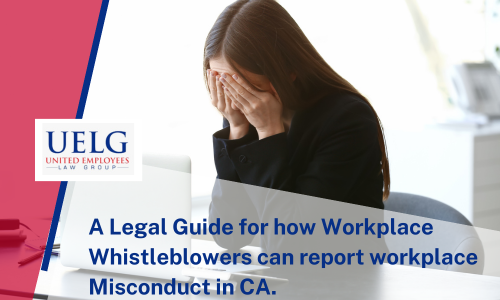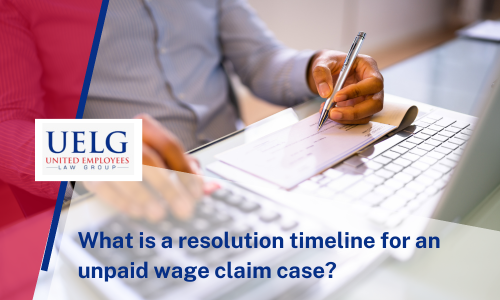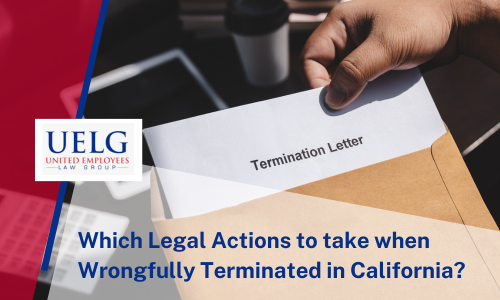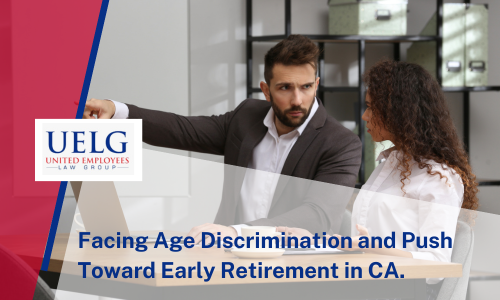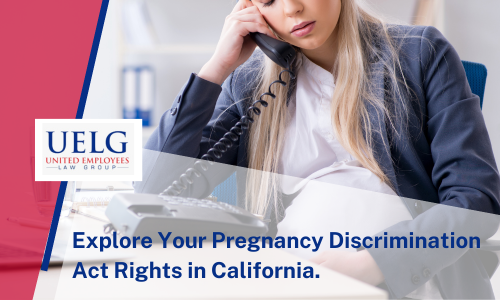What California Pregnancy Discrimination laws protect pregnant women? Pregnant employees are protected by law in California. These laws, generally, permit women to seek time off during and after pregnancy without fear of discrimination. These laws also offer a variety of advantages and benefits to pregnant women, including a reasonable amount of break time and use of a private room, reduced workloads, health examinations, and more.
California’s Fair Employment and Housing Act (“FEHA”) applies to most employers with five or more employees and makes it unlawful for employers to discriminate on the basis of pregnancy. The FEHA also requires that employers provide reasonable accommodations to employees disabled by their pregnancy, including time off for prenatal care medical appointments, help with harder physical duties, more frequent breaks, and other job modifications, a period of leave under certain circumstances, and any other reasonable workplace adjustments that will allow pregnant employees to continue working as safely and effectively as possible. California law also provides pregnant employees and those with newborns with additional leave and other protections, under California’s Pregnancy Disability Leave Law (“PDL”)(employers with 5 or more employees), the California Family Rights Act (“CFRA”) (50 or more employees), the New Parent Leave Act (“NPLA”)(20 or more employees), Lactation Accommodation (Labor Code §1030)(all employers), California Paid Family Leave (“PDL”)(covered employees though state program), and California State Disability Insurance (“SDI”) program.
Federal laws also address pregnancy discrimination and pregnancy leave. The Pregnancy Discrimination Act of 1978 (“PDA”) protects women who experience pregnancy, childbirth, or any pregnancy-related condition or disability. Other federal laws offering protection to pregnant workers and those with newborn children include, but are not limited to, the Family and Medical Leave Act (“FMLA”), Title VII of the Civil Rights Act of 1964; the Americans with Disabilities Act (“ADA”) and the Pregnant Workers Fairness Act.
In sum, under both California and federal laws, discrimination based on pregnancy or any associated medical condition related to the pregnancy is forbidden. Businesses in the Golden State are not allowed to fire an employee or engage in other unlawful actions just because they are pregnant.
Unfortunately, certain businesses within California still treat expecting employees unfairly, for instance, when the expectant employee requests necessary adjustments to their workplace responsibilities because of their pregnancy. If you believe you have suffered from employee discrimination because of your pregnancy at the workplace in California, discussing the concern with an employee rights lawyer at UELG can help you understand your legal rights and the procedure for the filing of compensation claims. Our pregnancy discrimination Lawyer will help you prove the pregnancy discrimination in the CA workplace that you have experienced.
What rights do pregnant workers have under federal and state laws, including the Pregnancy Discrimination Act?
Under federal and California employment laws, some basic principles assist to support the rights of Pregnant Workers. Some of these include:
- The federal Pregnancy Discrimination Act of 1978, California’s FEHA and other federal and state laws described herein prohibit employers from terminating work relationships just because of a pregnant worker’s condition of pregnancy.
- These federal and state laws provide a certain number of days, weeks, or months of unpaid leave for expecting workers at most California businesses.
- These federal and state laws, including the California Fair Employment and Housing Act (FEHA), require companies to provide reasonable accommodations for mothers who are unable to perform certain of their job duties or tasks due to their condition of pregnancy.
- The federal Fair Labor Standards Act (FLSA) requires employers to make reasonable accommodations for pregnant workers. Retaliating against employees or underpaying them as a result of these concessions is likewise prohibited.
- Under the federal Family and Medical Leave Act (FMLA) and other California pregnancy laws, pregnant workers may take time off from work if they need to care for their unborn child or have difficulties during pregnancy or childbirth. Certain federal and state family and medical leave regulations may apply to workers who have been employed by a corporation for less than a year.
Seeking legal recourse to better understand pregnant employee rights? Talk to UELG’s experienced pregnancy discrimination lawyer.
If you believe you are a victim of pregnancy discrimination in California, you should seek legal counsel and representation. UELG’s employee rights attorney offers knowledgeable and proficient counsel. The skilled pregnancy discrimination lawyers associated with our law firm are always here to assist you with your legal issue of pregnancy discrimination in the state of California. We assist workers and individuals to better understand their rights about pregnancy discrimination at work and are dedicated to helping to develop a more pleasant and unbiased working culture for everyone.
Conclusion
Employees who have faced discrimination because of their pregnancy should keep records of their encounters, speak with their employers or the HR department, and also get legal advice from UELG’s lawyer for discrimination at work. To get a fair settlement and recompense for these injustices, mediation, and other legal action may be warranted. Employers and employees can explore their options, learn about their rights and obligations, and take prompt action to stop prejudice with the support of available resources.
We hope that California legislation and federal legislation further encourage employers to combat prejudice. It takes knowledge, perseverance, and adherence to those rules to provide pregnant workers who have experienced discrimination the ability to fight back. Contact us at (888) 545-0013 to get a free case evaluation.



